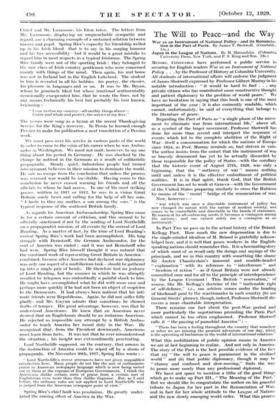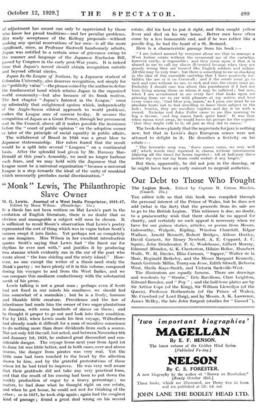The Will to Peace—and the Way
MESSRS. CONSTABLE have performed a public service in securing for English readers War as an Instrument of National Policy . . . by the Professor of History at Columbia University. All students of international affairs will endorse the judgment of James Shotwell expressed by Professor Gilbert Murray in his notable introduction : " it would be hard to find . . . any private citizen who has contributed more constructive thought and patient diplomacy to the problem of world peace." We have no hesitation in saying that this book is one of the most important of the year ; it is also eminently readable, which cannot, unfortunately, be said of everything that belongs to the literature of peace.
Regarding the Pact of Paris as a single phase of the move- ment to eliminate war from international life," above all, as a symbol of the larger movement, Professor Shotwell has done far more than record and interpret the sequence of events which led to the complete abolition of the Right of War—itself a consummation for which the nations of Europe since 1924, as Prof. Murray reminds us, had striven in vain. The author insists from the outset that the instrument of war so bravely denounced has yet to be actually discarded by those responsible for the policy of States—with the corollary that the historic event of August 27th, 1928, was only a beginning, that the " outlawry of war " means nothing until and unless it is the effective embodiment of political realities. It is in that spirit, thank God, that the British Government has set to work at Geneva—with the Government of the United States preparing similarly to cross the Rubicon by means of the " moral bridge of the renunciation of war.
Now, however :-
" war which was once a directable instrument of policy has now changed its nature with the nature of modem society, and ceases to be controllable and directable in the hands of statesmen. By reason of ith all-embracing needs, it becomes a contagion among the nations ; and one cannot safely use a contagion as an instrtunent."
In Part Two we pass on to the actual history of the Briand- Kellogg Pact. How much the new dispensation is due to the single-minded idealism of M. Briand is gratefully acknow- ledged here, and it is well that peace workers in the English- speaking nations should remember this. It is a fascinating story of which most of us recall only the doings and sayings of the principals, and we in this country with something like shame Sir Austen Chamberlain's innocent and muddle-headed " explanation " with its reference to " interference " and " freedom of action "—as if Great Britain were not already committed once and for all to the principle of interdependence by the League Covenant ! This British " reservation," of course, like Mr. Kellogg's doctrine of the " inalienable right of self-defence," i.e., suo arbitrio comes under the heading of blackmail paid to the reactionaries in each country (to use General Smuts' phrase), though, indeed, Professor Shotwell dis- covers a more charitable interpretation.
There remains one fact about the post-War period and more particularly the negotiations preceding the Paris Pact which cannot be too often emphasized. Professor Shotwell calls it " the passing of parochial America" :—
" There has been a feeling throughout the country that somehow or other we are missing the greatest adventure of our day, which is the uprooting of barbarism in the world of international relations."
What this mobilization of public opinion means in America we arc at last beginning to realize. And not only in America. The story of the Pact is the best possible evidence of the fact that (a) the will to peace is paramount in the civilized world " and (b) that public diplomacy, though it may be " clumsy and confused and slow-moving," finds the way to peace more surely than any professional. diplomat.
We have not space to mention a tithe of the good things which go to make up Part III., " The Meaning of the Pact." But we should like to congratulate the author on his graceful tribute to Japan for her part in the Renunciation of War, and in fact for her whole attitude to the League of Nations and the new slowly emerging world order. What this process of adjustment has meant can only be appreciated by those who know her proud traditions—and her peculiar problems. Her ready acceptance of the Kellogg proposals—without making any special reservations of her own—is all the more significant, since, as Professor Shotwell handsomely admits, Japan was entitled to a certain sense of grievance owing to the manner and language of the Japanese Exclusion Bill, passed by Congress in the early post-War years. It is indeed time that Japan's record should obtain recognition outside- and beyond official circles.
Japan In the League of Nations, by a Japanese student of Columbia University, also deserves recognition, not simply for its "publicity value"—the phrase coined by the author to define the fundamental bond which retains Japan in the organized world community—but also because of its frank realism. The last chapter " Japan's Interest in the League,'' sums up admirably that enlightened egoism which, independently of the Anglo-Saxon ethical approach to world problems, makes the League sure of success to-day. It secures the recognition of Japan as a Great Power, through her permanent seat in the Council, above all it makes possible the insistence before the " court of public opinion " on the adoption sooner or later of the principle of racial equality in public affairs.
The withdrawal of Brazil in 1926 was a great blow to Japanese statesmanship. Her rulers feared that the result would be a split into several " Leagues " on a continental basis. After the splendid lead given by Mr. Ramsay Mac- Donald at this year's Assembly, we need no longer harbour such fears, and we may hold with the Japanese that the League must be a universal organization " because a universal League is a step towards the ideal of the unity of mankind which necessarily precludes racial discrimination."









































 Previous page
Previous page